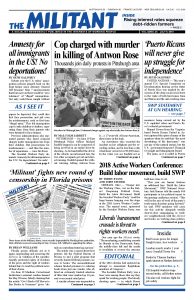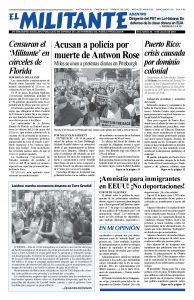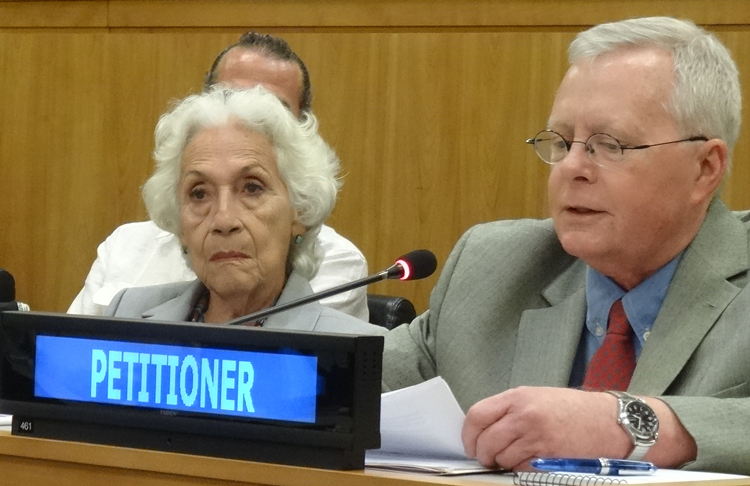The following is the statement by John Studer, editor of the Militant newspaper, given on behalf of the Socialist Workers Party at the June 18 U.N. Special Committee on Decolonization hearing.
Distinguished Chairman and committee members,
Dear friends and fellow fighters from Puerto Rico, revolutionary Cuba, and the United States who are here today to speak out against Washington’s brutal colonial rule,
I recently returned from Puerto Rico, where I had the pleasure of meeting workers, unionists, fishermen, students and others in Yabucoa, Humacao, and other areas hard hit by Hurricane Maria. They have been protesting because nearly nine months later, tens of thousands still have no electricity. The hurricane’s impact was not primarily a natural disaster. It was and is a social catastrophe, created by colonial domination and capitalist rule.
Working people in Puerto Rico face never-ending attacks from the U.S.-appointed fiscal control board and the colonial government, whose priority is to pay the wealthy U.S. bondholders on the $74 billion debt at the expense of the vast majority. They have slashed jobs and pensions, closed schools, pushed up tuition at the University of Puerto Rico, and eroded workers’ hard-won protections. My party demands: Cancel the immoral debt!
I am the editor of the Militant, a socialist newsweekly published in the interests of working people. I speak here today on behalf of the Socialist Workers Party. Since its founding in 1938, our party has fought for the Puerto Rican people’s right to self-determination and independence from U.S. rule. We call on workers and farmers worldwide to extend solidarity to the people of Puerto Rico who are protesting these attacks and searching for a road forward out of colonial oppression and capitalist exploitation.
A successful fight for Puerto Rico’s independence from Washington’s domination is in the direct interests of working people in the U.S. We face a common enemy — the U.S. ruling capitalist class.
Here in the U.S., the employers are attacking our wages, jobs, health care, pensions and our unions. Working people are killed and maimed as cannon fodder in their imperialist wars. We face our own version of Puerto Rico’s debt bondage — mounting debts that are ruining small farmers and squeezing college students, workers and the elderly.
In response to these worsening conditions, something new is developing among working people in the U.S. We saw it in the wave of revolts by teachers that shook West Virginia, Kentucky, Oklahoma, Arizona, Colorado and North Carolina. The teachers’ successful strike battles show the fighting capacity of the working class: their initiative, creativity, solidarity, and growing distrust of the Democrats and Republicans — the twin parties of the capitalist ruling class.
Through our own experiences, workers and farmers in the U.S. can identify with the resistance in Puerto Rico to the U.S. junta’s brutal cutbacks. More become convinced that workers in the U.S. cannot be free as long as Washington maintains its colonial bondage over Puerto Rico. Fighting together we can win.
In both Puerto Rico and the U.S., working people are looking for a road to defend themselves. There is growing understanding that the social disaster inflicted on us is simply the result of how the capitalist system works. And that workers are the only class capable of leading a way out of this worldwide crisis.
There is a living example for us to emulate. Cuba’s socialist revolution shows what workers and farmers in our millions can accomplish when we take state power, wresting it from the capitalist minority. In doing so, we can transform ourselves and begin to run society in the interests of the majority. We can use that state power to extend solidarity worldwide to others fighting to be free from imperialist domination and capitalist exploitation.
This is the road forward for working people both in Puerto Rico and the U.S. It’s the road to genuine independence for Puerto Rico — which will never be granted — it must be taken.
Mr. Chairman, I thank the committee for the opportunity to speak here today, and I urge its continued condemnation of U.S. colonial rule over Puerto Rico.


